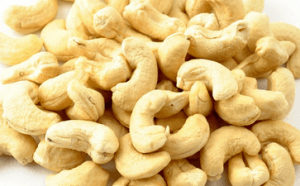Ghanaian cashew farmers leverage technology to receive better prices
 An increasing number of Ghanaian smallholder cashew farmers are getting better prices on their harvests, and reducing their operations expenses, thanks to the continued rollout of a smartphone app that gives them direct access to Olam Food Ingredients in Ghana.
An increasing number of Ghanaian smallholder cashew farmers are getting better prices on their harvests, and reducing their operations expenses, thanks to the continued rollout of a smartphone app that gives them direct access to Olam Food Ingredients in Ghana.
The app empowers farmers to get prices directly from the company rather than from traditional buying agents, which yields not only higher prices for their cashews but cost savings on their expenses.
This can have significant positive impacts on farmers and their communities: if the average daily food budget for a typical household of five is GH¢14 GH¢15 (equivalent to $2.40 – $2.58), farmers using the app can receive funds worth another month of food.
It is one part of a robust, proprietary solution called ‘Olam Direct’, which was developed in-house to provide a variety of apps and tools to not only provide greater transparency on pricing, but access to inputs like better fertilizer use and farming advice such as insights on efficient land use to fight climate change.
The purchasing app was first piloted in 2018 and involved approximately 1,000 farmers and 125 tonnes of cashews. This year, over 5,400 farmers are participating and selling 3,100 tonnes, and Olam sees the number increasing to 8,000 tonnes in 2021.
“When we empower farmers to do better for themselves, whether through business operations or supporting their communities and environments, we all win,” said Mr. Anantharaman. Shekhar, CEO, Olam Food Ingredients.
“Olam Direct is a textbook example of using technology to disintermediate and transform a supply chain so that it works more efficiently and fairly. Sustainability depends on the health and success of farmers on whom our customers depend and working together, we can meet the increasing demands of consumers for food products that are not only natural but right for both planet and producer,” Mr. Shekhar said.
In addition, farmer participation in Olam Direct also provides the company’s customers with traceable and reliable visibility into their purchases (all transactions are geotagged and timestamped, with farmers’ consent) and delivered via its AtSource platform.
It is a core technology pillar for delivering Olam’s long-term vision to re-imagine agribusiness and food supply by focusing on empowering farmers and customers.
“Olam Direct, as a new and unique buying model, has equipped us to engage with cashew farmers directly and create a relationship which is beyond transactional nature,” said Mr. Amit Agrawal, Country Head of Olam Ghana Limited.
“Through it, we provide more transparency in price to farmers and help them appropriate better margins by disintermediating aggregators in the cashew supply chain. We also work with cashew farmers in the off-season providing them knowledge training, need-based farmer loans, and farming inputs,” Mr. Agrawal said.
Established in 1994, Olam Food Ingredient’s global cashew business has grown in Ghana through strong, year-round farmer relationships that extend beyond the harvest season; its training programmes in good agricultural practice encourage sustainability and over 30 programmes on 12 different relevant topics were delivered in 2019.
A programme to train 400 female farmers as beekeepers in the off-season already produced anecdotal increases in income of 15 per cent.
Intriguingly, the programme’s success evidences a broader transformation of the sector: Almost half of the farmers benefiting from the Olam Direct programme are women and, as numerous studies find that they are responsible both for farm productivity and family health and well-being, it delivers direct and indirect benefits to entire communities.
Additionally, many of the buying agents have transitioned to become micro-collectors for its digital transactions, thereby creating new job opportunities, and Olam is pioneering organising individual farmers to form groups so they can have greater voices in the selling process, as well as receive equal treatment.
Olam Direct also empowers farmers to receive market information and alerts from Olam, ask questions directly via the app, and provide feedback or report issues to the company.
Source: GNA
